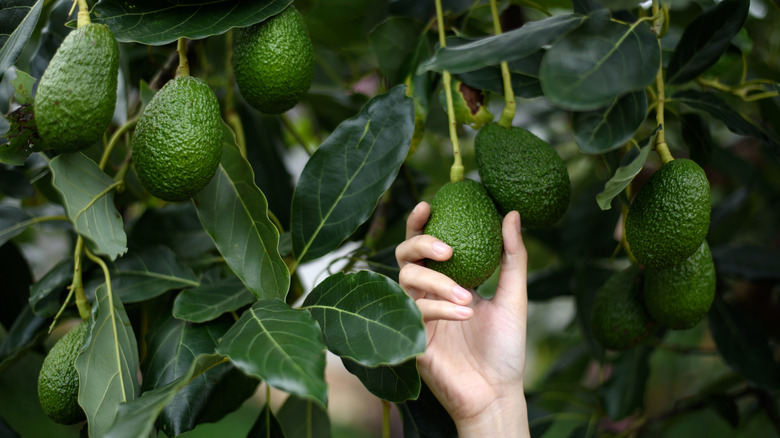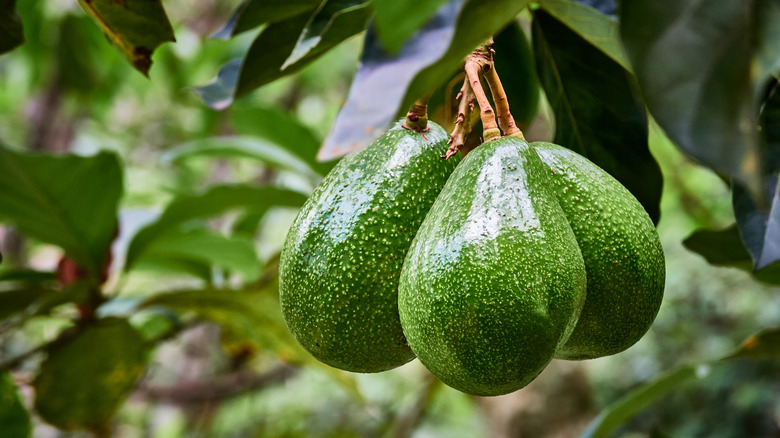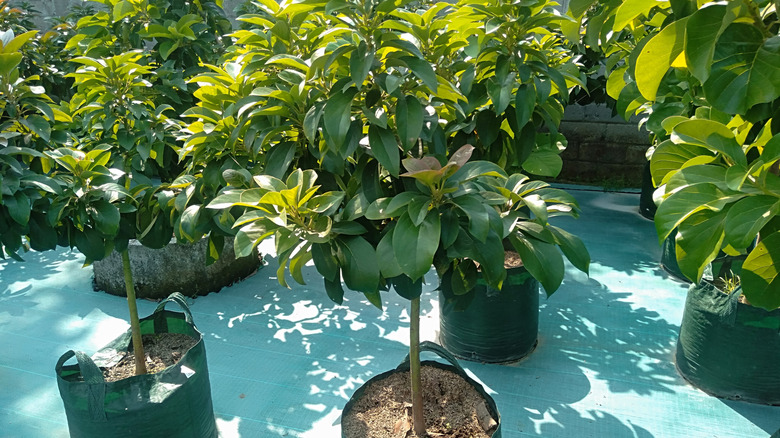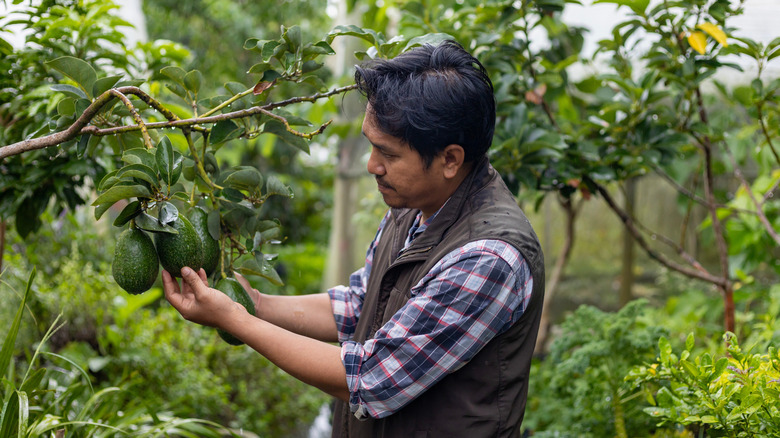The Kind Of Avocado Tree That Is Best For Your Garden Depending On Where You Live
Do you dream about making avocado toast with freshly harvested fruit? Make this vision a reality by growing your own avocado tree (Persea americana). Since most supermarket avocados come from Mexico, you might assume that a hot climate is required. That's not entirely true. The trick is choosing the right tree for the climate where you live. In the United States, USDA hardiness zones 9 through 11 (where temperatures rarely drop below 20 degrees Fahrenheit) are best for growing avocados. This includes most of Florida, California, and Hawaii, plus parts of Louisiana, Texas, and Arizona.
However, if you live in a state where winter temperatures plunge lower than this, you can still grow fruit on a cold-hardy avocado tree. Interestingly, many cultivars that can handle a chill hail from Mexico. Meanwhile, West Indian avocados are averse to cold conditions, so these trees are primarily grown in southern Florida. Guatemalan avocados fall somewhere in the middle when it comes to cold hardiness. They'll grumpily tolerate temperatures as cold as 25 degrees Fahrenheit, but not for long.
'Hass' (a Mexican-Guatemalan hybrid) and other Guatemalan avocados thrive in regions with air that's somewhat humid and temperatures that usually stay between 60 and 85 degrees Fahrenheit. These conditions correspond with growing zones 10a through 11b, where temperatures in the 30s are rare. In Florida, West Indian avocados such as 'Simmonds' are grown in zones 10b and 11a, where temperatures seldom drop below 40 degrees Fahrenheit. If you're in zone 8a or 8b, the coolest parts of the country where you can grow avocados outdoors year-round, you'll have the most success with cold-hardy Mexican avocados such as 'Pancho' and 'Del Rio.' The lowest temperatures these zones experience are between 10 and 20 degrees Fahrenheit.
The best types of cold-hardy avocados
Cold-hardy Mexican and Mexican-hybrid avocados can be grown in climates that are quite different from Mexico's. The most cold-hardy option, 'Del Rio,' produces small, flavorful fruits, even when temperatures briefly drop to 15 degrees Fahrenheit. 'Del Rio' tends to grow tall, so prune this plant in early spring to keep as much fruit as possible within reach.
'Pancho' avocados can withstand short stretches of temperatures as cold as 20 degrees Fahrenheit. This makes it a solid choice for gardeners in USDA hardiness zones 8 and 9, where winter temperatures dip below the freezing point but don't get especially frigid. It's also happy in zones 10 and 11, which are more tropical. If you grow 'Pancho' there, provide it with afternoon shade for optimal growth.
Though 'Pancho' can manage a bit of frost, 'Hass' isn't quite as accommodating. Though 'Hass' is technically suited for zones 9a to 11b, it may struggle to survive winter in 9a, which includes parts of California, Texas, and Florida. 'Hass' makes up for this drawback with several benefits. It can produce harvests for months at a time, and its fruit is known for its creamy texture and lengthy shelf life. Like most fruit trees, 'Hass' needs a planting site that drains water efficiently. This helps prevent root rot and other problems caused by waterlogged soil. Though 'Hass' can manage chilly temperatures that don't leave frost on its foliage, it's likely to shed leaves and flowers during cold snaps. To keep it content, plant it in a spot that gets at least 6 hours of warming direct sunlight each day.
Growing avocados in colder climates
Live somewhere that experiences deep freezes in the winter? You can still grow your own avocados — even the 'Hass' type. To set yourself up for success, select a tree that's both cold-hardy and container-friendly. One of your best bets is a dwarf 'Hass' tree grown in a pot that you can move to a warmer area. Since 'Hass' starts to protest when temperatures drop below the 30s, relocate it to an enclosed patio or greenhouse if wintry weather is forecast. When doing so, place your tree by a sunny window so it gets enough light to make fruit.
If you're diligent about protecting your potted 'Hass' from frost, it will grow in zones 3 through 11. That swath covers most of the United States and much of Canada. Or try another cold-hardy variety that appreciates the container lifestyle. Sometimes called 'Wurtz,' 'Little Cado' is self-pollinating, so you'll get a full harvest with just one tree. It usually reaches a height of five to 10 feet, making it ideal for containers you plan to move inside. It's also content in gardens in zones 9 through 11.
If you want to grow 'Hass' in zones 9, 10, or 11, consider planting it in the ground since avocado trees yield the most fruit when grown this way. You can help a potted avocado tree bear more fruit using hand pollination methods.
Avocado varieties for hot environments
Looking for avocados that thrive in the warmest parts of the United States? 'Hass' isn't wild about sweltering temperatures, so be sure to know your other options. West Indian 'Simmonds' does well in USDA hardiness zones 10b and higher. In the U.S., these areas are mostly located in South Florida and Hawaii. Another option is 'Lamb Hass,' which looks and tastes like 'Hass' but can handle more heat. It also boasts a longer growing season. It's generally happy in zones 9 through 11.
Beginner-friendly 'Reed' is another variety that likes the hot weather in zones 10-11. Since this avocado cultivar doesn't need much water to thrive, it's a good fit for gardeners in the hot and dry Southwest. Give your fledgling tree some wind protection and shade for best results in the desert. Also, amend sandy soil with nutrient-rich compost when planting and fertilize your avocado tree regularly. Unlike many other avocado cultivars, 'Reed' can produce lots of fruit without a cross-pollination partner. This means you can plant just one tree and still have plenty of avocados for your toast.
If limited growing space is your main concern, consider avocado trees with compact growth habits. A favorite among growers in Arizona, 'Holiday' is a semi-dwarf tree that grows to a maximum height of 15 feet – about half as tall as many full-size avocado trees. Another short variety to consider is 'Gwen.' In addition to being a good choice for small gardens and containers, this cultivar is known for big yields of big fruit. Both 'Gwen' and 'Holiday' thrive in zones 9 through 11.



